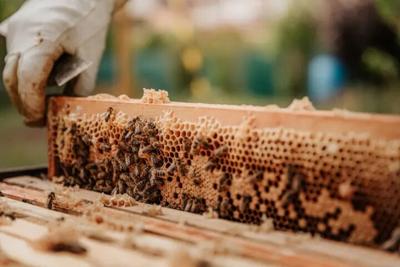In the heart of Chicago’s concrete jungle, a quiet, golden revolution is taking place on rooftops. From the Southport Corridor to O’Hare Airport, rooftop apiaries are transforming the city’s skyline into a haven for honeybees. These urban beekeeping efforts are not only producing local honey but also playing a vital role in pollinator conservation, sustainability, and environmental education.
Honeybee populations are declining due to habitat loss, pesticide use, disease, and climate change. Urban apiaries, managed colonies of honeybees, help combat this trend by supporting pollinator health and providing a safer, pesticide-free environment. Cities like Chicago are proving that bees can thrive even amid skyscrapers.
Honeybees play a crucial role in urban agriculture. They pollinate flowering plants, community gardens, and green roofs, increasing crop yields and biodiversity. According to the U.S. Department of Agriculture, one-third of the food we eat depends on pollinators. Without them, urban ecosystems and our food systems would suffer.
Where Chicago Bees Call Home
One of the city’s earliest pioneers in sustainable beekeeping is the Chicago Honey Co-op, a community-driven effort that has provided locally produced honey and educational outreach since 2004. Their focus on organic practices and environmental justice has inspired a new generation of urban apiarists.
Beehives at O’Hare International Airport may come as a surprise. Still, the airport hosts one of the largest airport apiaries in the world, with more than 75 hives managed by the North Lawndale Employment Network. The initiative not only boosts bee populations but also provides job training in sustainable beekeeping for formerly incarcerated individuals.
Bike a Bee adds a unique twist to beekeeping management by delivering services on bicycles. Operating over 30 hives across community gardens, schools, and rooftops, they embody Chicago’s eco-conscious spirit.
Southport Corridor Bees and Best Bees Company are two more examples of hyperlocal beekeeping initiatives. They bring bees back to backyards, businesses, and balconies while supporting scientific research and monitoring pollinator health.
Rooftopapiaries also create a platform for environmental education and green infrastructure. Schools, restaurants, and businesses across the city are installing beehives as part of their efforts to achieve sustainability goals. These efforts help teach students and community members about pollination, climate change, and the delicate balance of ecosystems.
Apiaries are also good news for biodiversity. In the city, bees have access to a diverse array of flowers, ranging from backyard gardens to blooming trees lining the streets. The result? Local honey with a depth of flavor that changes with the neighborhood. It’s called “hyperlocal honey,” and it's proof that nature doesn’t just survive in the city; it adapts, thrives, and even tastes better.
Health Benefits of Local Honey
Homeopaths and alternative medicine practitioners often promote local honey as a remedy, believing small doses of pollen may build tolerance to allergens. It’s also used for its anti-inflammatory and antibacterial properties to support immunity and aid digestion.
However, these claims are anecdotal. Scientific studies haven’t confirmed medical benefits, and most doctors view honey as a supplement, not a substitute, for proven treatments.
Local honey has found its way into daily routines in various ways. Some people tend backyard hives, others support nearby honey vendors, and many plant pollinator-friendly favorites like coneflowers and bee balm to help bees thrive. It doesn’t have to be a big gesture. Every small effort helps keep bees thriving.








(0) comments
Welcome to the discussion.
Log In
Keep it Clean. Please avoid obscene, vulgar, lewd, racist or sexually-oriented language.
PLEASE TURN OFF YOUR CAPS LOCK.
Don't Threaten. Threats of harming another person will not be tolerated.
Be Truthful. Don't knowingly lie about anyone or anything.
Be Nice. No racism, sexism or any sort of -ism that is degrading to another person.
Be Proactive. Use the 'Report' link on each comment to let us know of abusive posts.
Share with Us. We'd love to hear eyewitness accounts, the history behind an article.